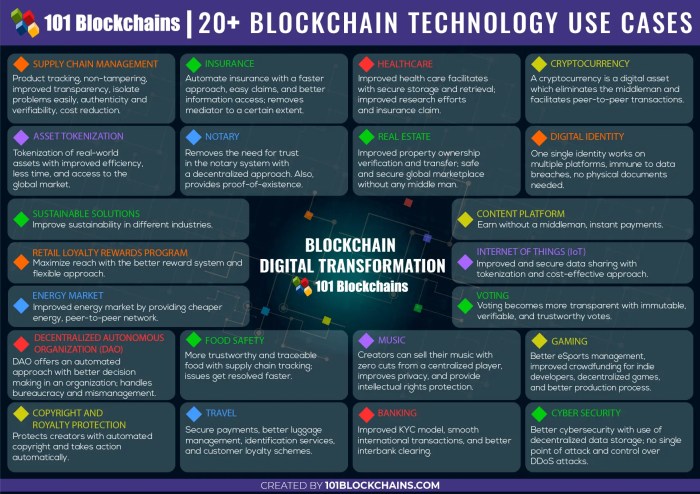Blockchain use cases encompass a wide array of industries and innovative solutions, showcasing the versatile applications of this groundbreaking technology. From supply chain management to financial transactions, the potential of blockchain is vast and transformative. Let’s delve into the fascinating world of blockchain use cases and discover how this technology is reshaping various sectors.
Overview of Blockchain Technology: Blockchain Use Cases

Blockchain technology is a decentralized, distributed ledger system that allows for secure and transparent transactions without the need for a central authority. It works by recording transactions in blocks that are linked together in a chain, creating a permanent and unalterable record.
Key Components of a Blockchain
- Blocks: These are data structures that contain transactions along with a timestamp and a reference to the previous block.
- Decentralization: The network is distributed across multiple nodes, eliminating the need for a central authority.
- Consensus Mechanism: This is the protocol that ensures all nodes agree on the validity of transactions, such as Proof of Work or Proof of Stake.
- Cryptography: Each block is secured through cryptographic hash functions, making it tamper-proof.
Benefits of Using Blockchain Technology
- Immutability: Once a transaction is recorded on the blockchain, it cannot be altered or deleted, ensuring data integrity.
- Transparency: All participants in the network have access to the same information, promoting trust and accountability.
- Security: The decentralized nature of blockchain, combined with cryptographic algorithms, makes it highly secure against hacking and fraud.
- Efficiency: By removing intermediaries and automating processes, blockchain can streamline transactions and reduce costs.
Common Use Cases for Blockchain

Blockchain technology is utilized in various industries to enhance security, transparency, and efficiency. Let’s explore some common use cases where blockchain plays a crucial role.
Blockchain in Supply Chain Management
Blockchain technology is revolutionizing supply chain management by providing a transparent and immutable ledger of transactions. Companies can use blockchain to track the movement of goods across the supply chain, ensuring authenticity and reducing the risk of fraud. Smart contracts on the blockchain can automate processes such as payments, verification of goods, and compliance with regulations. This helps in improving traceability, reducing costs, and enhancing trust among all parties involved in the supply chain.
Blockchain in Financial Transactions
In the financial sector, blockchain is transforming the way transactions are conducted. Blockchain enables secure and transparent peer-to-peer transactions without the need for intermediaries. Cryptocurrencies like Bitcoin and Ethereum leverage blockchain technology to enable seamless and efficient cross-border payments. Smart contracts on the blockchain automate the execution of agreements, ensuring trust and efficiency in financial transactions. Additionally, blockchain technology enhances security by providing a tamper-proof record of transactions, reducing the risk of fraud and enhancing accountability.
Real-world Applications of Blockchain
Blockchain technology has found various applications across different industries, revolutionizing processes and enhancing security and transparency. Let’s explore some specific examples of companies implementing blockchain technology and how it is transforming the healthcare industry and voting systems.
Blockchain in Healthcare, Blockchain use cases
Blockchain technology is making significant strides in the healthcare sector by ensuring secure and transparent management of patient data. Companies like Medicalchain are using blockchain to create a decentralized platform where patients can securely store and share their medical records with healthcare providers. This not only streamlines the process of accessing medical information but also enhances data security and privacy.
Blockchain in Voting Systems
The use of blockchain in voting systems has the potential to revolutionize the way elections are conducted by providing increased security and transparency. Companies like Voatz are leveraging blockchain technology to create secure digital voting platforms that enable voters to cast their ballots remotely while ensuring the integrity and immutability of the voting process. By using blockchain, these systems can prevent tampering and fraud, thereby enhancing trust in the electoral process.
Challenges and Limitations of Blockchain

Blockchain technology, while promising, comes with its set of challenges and limitations that need to be addressed for widespread adoption.
Scalability Issues
One of the major challenges facing blockchain technology is scalability. As the number of transactions increases, the blockchain network can become congested, leading to slower transaction speeds and higher fees. This scalability issue poses a barrier to blockchain’s ability to handle a large volume of transactions efficiently.
Environmental Impact of Blockchain Mining
Blockchain mining, particularly in proof-of-work consensus mechanisms, requires significant computational power and energy consumption. This high energy consumption contributes to the environmental impact of blockchain technology, leading to concerns about carbon footprint and sustainability. Addressing the environmental impact of blockchain mining is crucial for the long-term viability of the technology.
Regulatory Challenges
Blockchain implementations face regulatory challenges due to the decentralized and often anonymous nature of transactions. Governments and regulatory bodies are still grappling with how to regulate blockchain technology effectively, especially in areas such as data privacy, taxation, and anti-money laundering. The lack of clear regulatory frameworks can hinder the adoption of blockchain in various industries.
In conclusion, the diverse use cases of blockchain highlight its potential to revolutionize numerous industries and processes, paving the way for a more secure and transparent future. As organizations continue to adopt blockchain solutions, the impact and possibilities are limitless, promising a paradigm shift in how we perceive and utilize technology.
When it comes to crypto investment, having a solid crypto HODLing strategy is crucial for long-term success. By holding onto your digital assets despite market fluctuations, you can potentially benefit from future price increases.
As the popularity of cryptocurrencies continues to rise, it’s important to be aware of common crypto security threats that could jeopardize your holdings. Stay informed and take necessary precautions to protect your investments.
One of the most common scams in the crypto world is phishing, where hackers attempt to steal your sensitive information. Learn effective ways of preventing crypto phishing scams to safeguard your funds and assets.

